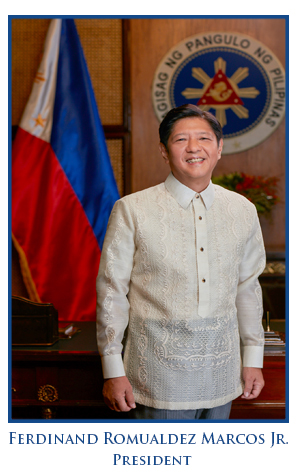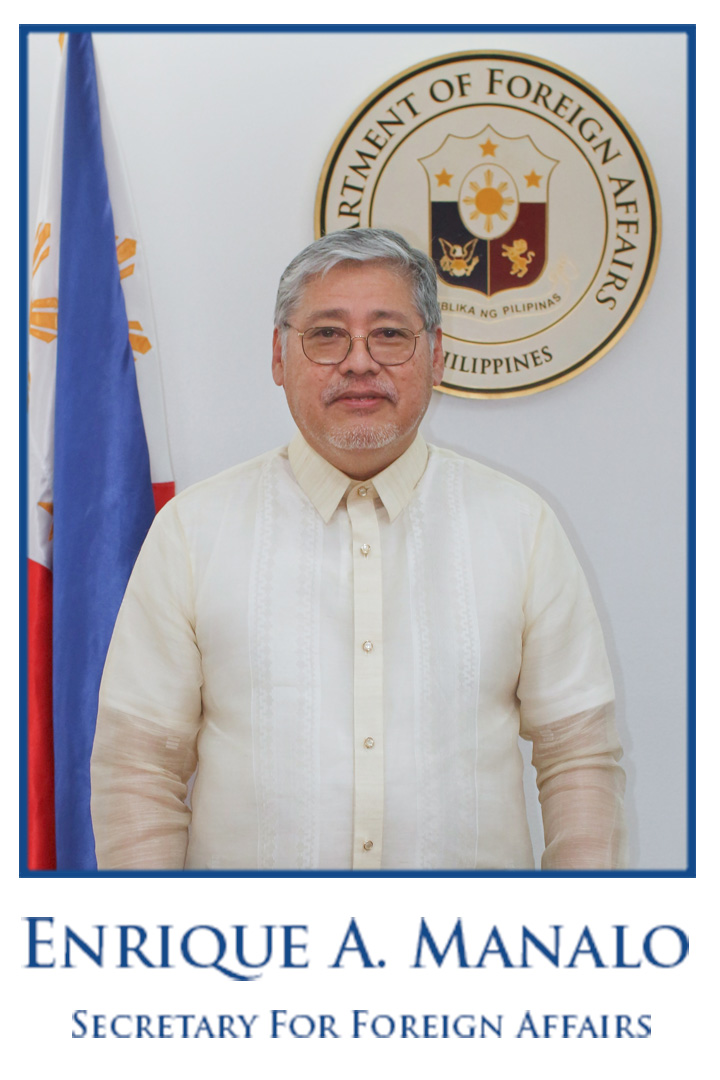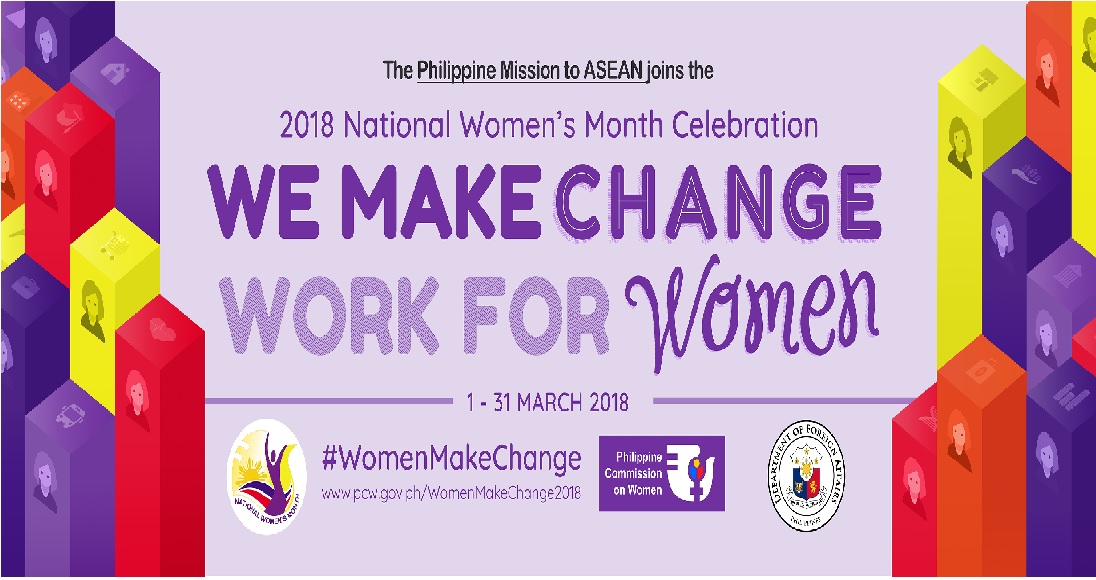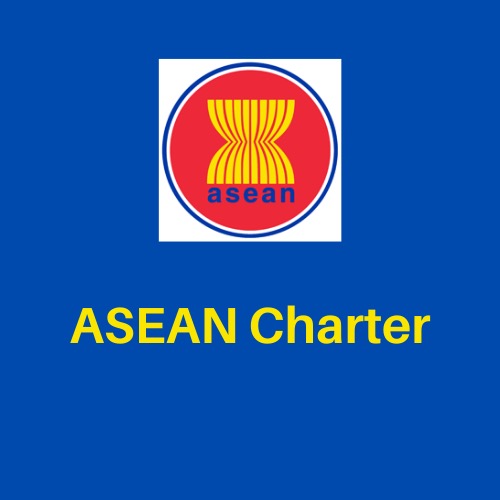- Hits: 2557
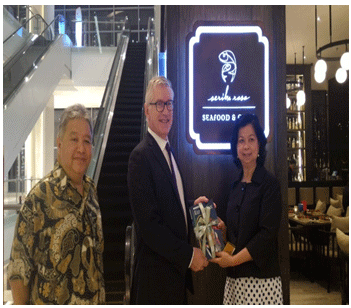
Ambassador to ASEAN Elizabeth P. Buensuceso meets with International Rice Research Institute (IRRI) Director General Dr. Matthew Morell and Deputy Director General Dr. Bruce Tolentino in Jakarta. The officials discussed possible collaborations between ASEAN and IRRI, particularly on the celebration of ASEAN's 50th Anniversary in 2017.
-END-
- Hits: 8713
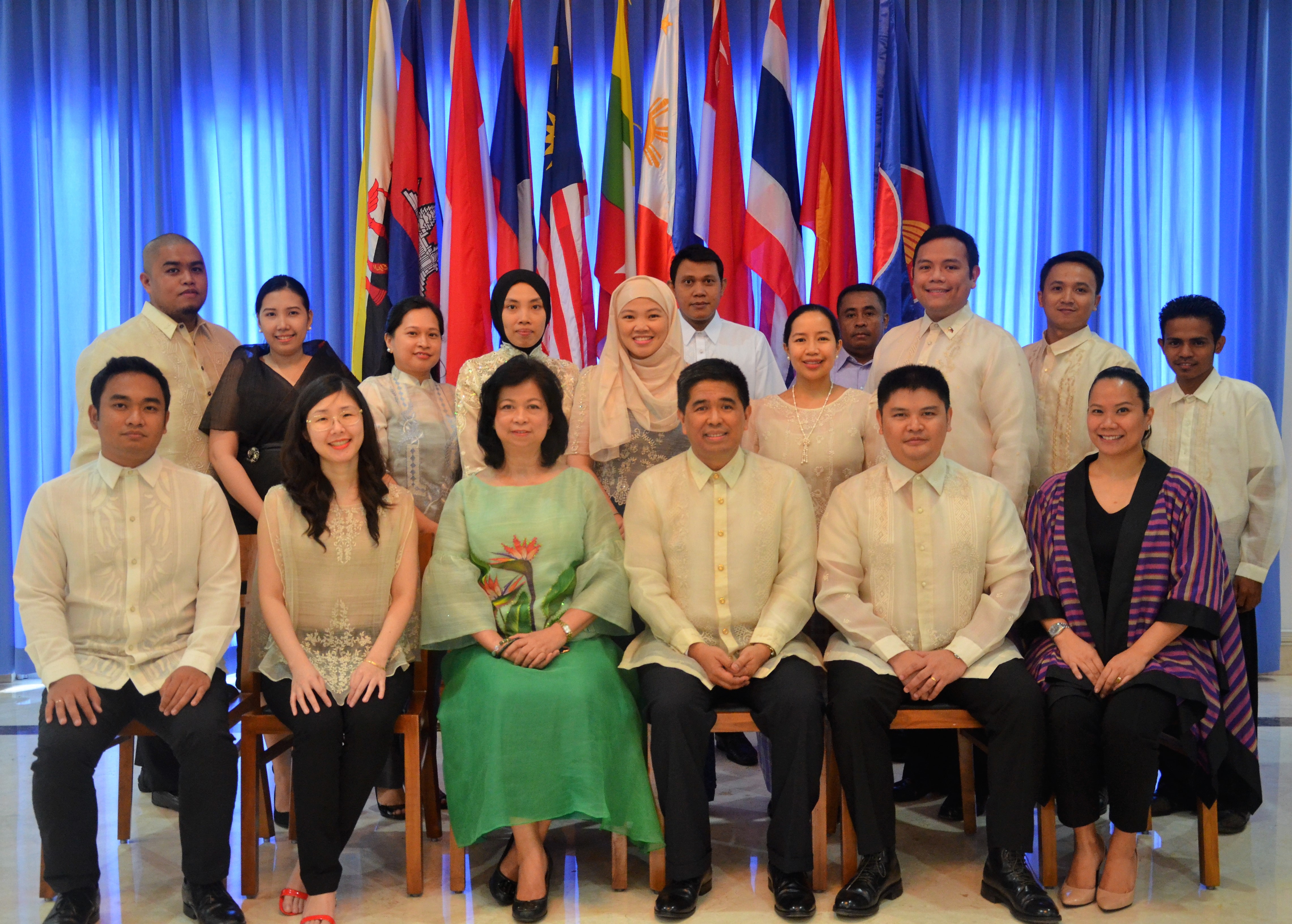
The Officers and Staff of the Philippine Mission: Marc Joseph O. Jaucian, Jazmin A. Luna-Jaucian, Carina B. Gaurana, Mugi Rahayu Mae Farida, Nihaya Macaradi, Tubagus Iman Wahyudi, Maria Cecilia P. Wenceslao, Yonatan Kune, Nilo Jay G. de Guzman Jr., Aan Herdiana, Mesak Patifar Efi, John Paul T. Samonte, Cecille Joyce Y. Lao, H.E. Elizabeth P. Buensuceso, Noel M. Novicio, Jan Sherwin P. Wenceslao, and Angella Gilberto L. Alfafara
The Permanent Mission - The Philippine Mission to ASEAN was formally established on 20 March 2009. Ambassador Elizabeth P. Buensuceso currently heads the Mission as Philippine Permanent Representative/Ambassador to ASEAN (March 2013-present). Previous PR’s were Ambassador Orlando Mercado (18 March 2009) and Ambassador Wilfrido Villacorta (13 January 2011).
The Permanent Representative is assisted and complemented by a team of Foreign Service Officers and Staff who are dedicated and committed to pursuing and advancing Philippine interests in ASEAN.
The Philippine Mission aligns its organization with the three (3) ASEAN Community Councils (ASEAN Political Security Community Council, ASEAN Economic Community Council, and ASEAN Socio-Cultural Community) by having separate units focused on the work of each ASEAN Community. Work assignments are also distributed in accordance with the external relations of ASEAN with the Ten Dialogue and other sectoral Partners, as well as with other ASEAN bodies and institutions such as the ASEAN Connectivity Coordinating Committee (ACCC), the ASEAN Foundation, The Initiative for ASEAN Integration Task Force (IAI-TF), the ASEAN Intergovernmental Commission on Human Rights (AICHR), and the ASEAN Institute for Peace and Reconciliation (AIPR).
The Office of the Permanent Representative – The Permanent Representative (PR) has the rank of Chief of Mission, Class 1. She is the Philippines’ Ambassador to ASEAN, pursuant to Article 12 of the ASEAN Charter, which necessitates each ASEAN Member State (AMS) to appoint a Permanent Representative based in Jakarta. All ten PRs comprise the Committee of Permanent Representatives (CPR).
In addition, the PR is also the Philippine representative to the ASEAN Connectivity Coordinating Committee (ACCC) , a member of the Board of Directors of the ASEAN Foundation, a member of the Governing Council of the ASEAN Institute for Peace and Reconciliation (AIPR) and the Task Force on the Initiative for ASEAN Integration (IAI TF). These bodies and the Committee of Permanent of Representatives conduct their operations according to Terms of Reference (TORs) mutually endorsed by ASEAN Member States.
As member of the CPR the Philippine Permanent representative shall:
1. Support the work of the ASEAN Coordinating Council, in line with Article 8 and other chapters of the ASEAN Charter, in the following aspects:
a) assisting in the preparation of the meetings of the ASEAN Summit;
b) coordinating the implementation of agreements and decisions of the ASEAN Summit;
c) acting as the approving authority for ASEAN cooperation projects funded from ASEAN's central funds;
d) coordinating with the ASEAN Community Councils to enhance policy coherence, efficiency and cooperation among them;
e) assisting with the coordination of the reports of the ASEAN Community Councils to the ASEAN Summit;
f) assisting in the consideration of the annual report of the
Secretary-General on the work of ASEAN;
g) assisting in the consideration of the report of the Secretary-General on the functions and operations of the ASEAN Secretariat and other relevant bodies, including reports on the administrative, financial and management procedures;
h) approving the annual operational budget of the ASEAN Secretariat; and
i) consider the report of the ASEAN Foundation.
2. Support the work of the ASEAN Community Councils, as elaborated in Article 9, and the ASEAN Sectoral Ministerial Bodies, as elaborated in Article 10, in the following aspects:
a) strengthening cooperation in the respective fields in support of ASEAN integration and community building;
b) coordinating across the community pillars and sectoral meetings of ASEAN to support policy coherence and coordination; and
c) assisting in the submission of reports and recommendations.
3. Liaise with the Secretary-General of ASEAN and the ASEAN Secretariat on all subjects relevant to its work, including the following aspects:
a) overseeing the operations of the Secretariat and related ASEAN institutions;
b) managing the rules of procedure for the accreditation of, and engagement with, entities associated with ASEAN; and
c) liaising with ASEAN Committees in Third Countries and International Organisations
d) conducting consultations with entities associated with ASEAN;
e) coordinating cooperative activities with external parties that have interests in ASEAN, but do not have any formal status in accordance with Article 44 (2);
f) coordinating with the Secretary-General of ASEAN in performing its role to monitor the implementation of ASEAN’s decisions and agreements.
4. Facilitate ASEAN cooperation with external partners, including the following aspects:
a) supporting the respective Country-Coordinators, in managing ASEAN’s cooperation with and policies towards Dialogue Partners, as well as facilitating engagement with Sectoral and Development Partners;
b) chairing and coordinating all matters related to ASEAN’s relations with the Dialogue Partner which the Philippines is currently coordinating ( currently: Australia)
c) preparing and supporting Ministerial and Summit level meetings with ASEAN's external partners, including the Post Ministerial Conferences, ASEAN+1 and ASEAN+3 Summits, the East Asia Summit (EAS) and the ASEAN Regional Forum (ARF);
d) acting as the approving authority for cooperation projects funded from ASEAN+1 and ASEAN+3 cooperation funds and monitoring their implementation;
e) supporting the ASEAN Senior Officials on ASEAN+3 matters, including monitoring and coordinating sectoral cooperation projects and assisting in their implementation;
f) supporting the ASEAN Senior Officials on EAS matters, including monitoring and coordinating sectoral cooperation projects and assisting in their implementation;
g) supporting the ASEAN Senior Officials on ARF matters, including consideration of project proposals and assisting in their implementation;
h) supporting the ASEAN Foreign Ministers Meeting in assessing the accreditation of Ambassadors of Non-ASEAN Member States to ASEAN;
i) liaising on ASEAN matters with Ambassadors of Non-ASEAN Member States; and
j) promoting ASEAN’s ties with other countries and regional and international organisations with interests in ASEAN.
5. Perform such other functions as may be determined by the ASEAN Coordinating Council.
In addition, the Philippine Permanent Representative also performs the following functions:
1. Represent the Philippines in the ACCC. Its main roles and functions are listed in its Terms of Reference, which includes the following:
a) Monitor, evaluate and review on a regular basis, or as appropriate, the implementation of the strategies, actions and projects of the Master Plan on the ASEAN Connectivity;
b) Coordinate with the National Coordinators, the Committee of Permanent Representatives to ASEAN , relevant ASEAN sectoral bodies and sub-regional arrangements to ensure that the implementation of the strategies, actions and projects are in line with the Master Plan on ASEAN Connectivity;
c) Identify issues and challenges, which arise from the implementation of the Master Plan on ASEAN Connectivity, and make appropriate recommendations to the ASEAN Summit through the ASEAN Coordinating Council;
d) Coordinate with ASEAN Dialogue Partners, multilateral development banks including various international and regional financial institutions, international organizations, private sector and other relevant stakeholders to promote the implementation of Master Plan on ASEAN Connectivity and mobilize all possible sources of funding;
e)Evaluate and recommend additional strategies , actions and prioritized projects to the ASEAN Summit through the ASEAN Coordinating Council;
f) Liaise with the National Coordinators to carry out outreach activities and consultations with stakeholders to raise awareness of ASEAN Connectivity;
g) Explore strategies to strengthen connectivity between ASEAN and other regions including East Asia and beyond; and
h) Undertake other activities as instructed by the ASEAN Coordinating Council.
2. Represent the Philippines Represent the Philippines in the IAI Task Force. Its main roles and functions are listed in its Terms of Reference, including the following:
a) To carry out all policies, directives and decisions of the ACC and advise the ACC on the approaches and mechanisms to effectively implement the Ministers’ decisions on matters pertaining to IAI;
b) To initiate and develop activities and programmes for the IAI Work Plan;
c) To provide policy guidelines in the areas of focus, including directions and general advice on the IAI Work Plan to the IAI & NDG Division of the ASEAN Secretariat;
d) To discuss and exchange views on development issues raised at regional and international fora which could have implications on CLMV;
e) To facilitate as the focal point for CLMV on the effectiveness of the IAI Work Plan and the dissemination of the results of its analysis of and recommendations on CLMV development trends, prospects and issues to appropriate ASEAN bodies;
f) To monitor the management of the IAI Work Plan through its involvement in the formulation, design, implementation, endorsement and review of IAI projects and programmes;
g) To be an integral component of the funding process, through:
1. the pooling of resources such as, expertise, institutions and physical assets to implement the IAI Work Plan; and
2. working closely with Dialogue Partners and other stakeholders interested in the development of CLMV, including developmental institutions and regional cooperative frameworks;
h) To coordinate its activities with other ASEAN bodies, sectoral committees, working groups set up within the IAI framework.
3. Represent the Philippines to the Governing Council of ASEAN Institute of Peace and Reconciliation (AIPR). The Institute undertakes research activities on peace, conflict management and conflict resolution, as requested by ASEAN Member States. Its functions include:
a) Undertake research and compile ASEAN’s experiences and best practices on peace, conflict management and conflict resolution as well as post-conflict peace-building, with the view to providing appropriate recommendations, upon request by ASEAN Member States, to ASEAN bodies
b) Undertake studies to promote gender mainstreaming in peace building, peace process and conflict resolution
c) Study and analyse existing dispute settlement mechanisms in ASEAN with a view to enhancing regional mechanisms for the pacific settlement of disputes
d) Hold workshops on peace, conflict management, conflict resolution
e) Hold seminars/workshops/training in promoting the voice of moderation to contribute to the Global Movement of the Moderates, as well as to advance work in the area of interfaith dialogue
f) Knowledge building among relevant government officials, scholars or think-tanks on conflict management and resolution
g) Develop a pool of experts from ASEAN Member States as resource persons to assist in conflict management and conflict resolution activities
h) Where appropriate and at the request of ASEAN governments, provide policy recommendations to ASEAN governments on promotion of peace and reconciliation based on their own studies, as well as facilitation for peace negotiation
i) Assist ASEAN bodies, upon request of ASEAN Member States, on activities and initiatives related to peace, reconciliation, conflict management and conflict resolution
j) Function as a knowledge hub by establishing linkages/network with relevant institutions and organisations in ASEAN Member States, as well as other regions and at the international level, which have similar objectives aimed at promoting a culture of peace
k) Collaborate with relevant UN agencies, regional organisations and international think tanks to exchange expertise and experiences on peace, conflict management, conflict resolution
l) Disseminate best practices, lessons learned and relevant information to ASEAN Member States
m) Outreach and engagement with the civil society and other relevant stakeholders to promote peace, reconciliation, conflict management, conflict resolution and peace-building; and
n) Promote awareness of the work of the Institute among the general public
4. Represent the Philippines in the Board of Trustees of the ASEAN Foundation. Its main roles and functions are listed in its MOU, including the following:
a) formulate the guidelines and procedures for the award of scholarships/fellowships and other activities of the Foundation;
b) have the overall responsibility for the Fund of the Foundation and shall be responsible for the formulation of policy for the procurement and the utilization of Fund for the Foundation;
c) approve projects seeking support from the Fund of the Foundation;
d) approve the annual operational budget for the Foundation;
e) perform such other functions as may be necessary to carry out the objectives of the Foundation; and meet at least once a year.
The Permanent Representative is assisted by Officers and Staff whose work assignments specialize in the three pillars of the ASEAN Community, the above-mentioned bodies , as well as ASEAN's relations with its External Partners , including its Ten Dialogue Partners, the UN, and other groups and countries. The Philippines is currently the Country Coordinator of AsEAN-Australia Relations.
PRESS RELEASES
Thursday, 12 June 2025
- Monday, 26 May 2025 ASEAN Fest 2025
- Monday, 07 August 2023 Going Green and Digital for a More Sustainable, Inclusive, and Prosperous Future for All
- Thursday, 02 February 2023 Ambassador Quintana Congratulates Head of Philippine Space Agency (PhilSA) for being conferred an Honorary Doctorate Degree by Hokkaido University
- Thursday, 19 January 2023 PH Mission joins the ASEAN Economic Community in advancing the region’s economic priorities for 2023

